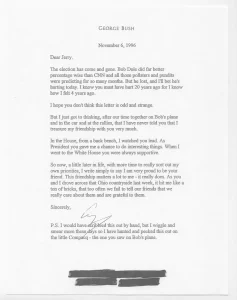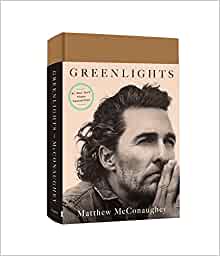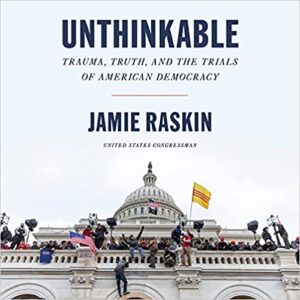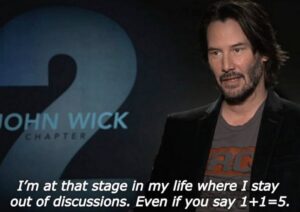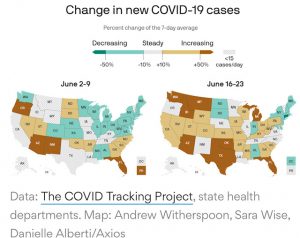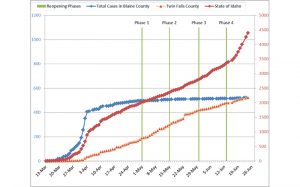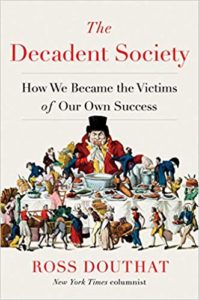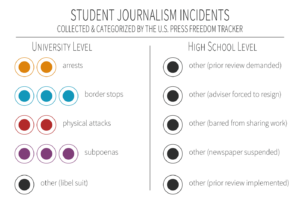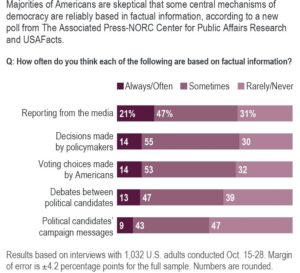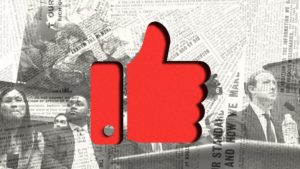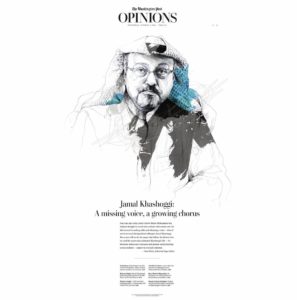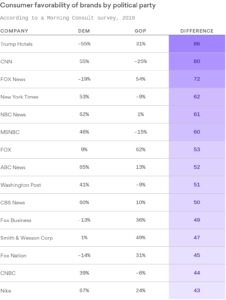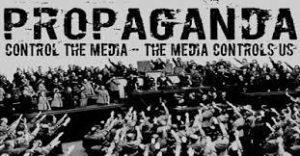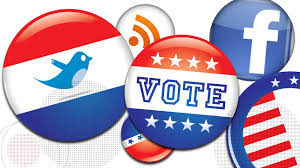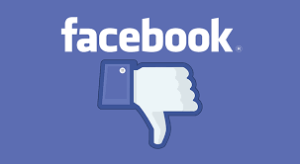Axios
Friday, May 6th, 2022
May 6, 2022♀︎
“I know that I say this all the time, but that’s only because it’s what gets me through the times when everything seems to be on fire.
No one is coming to save us
That’s why we have to save each other.”
-Eva
Director of Cybersecurity EFF
[Electronic Frontier Foundation]
Go forth to what? To uncertainty,
to a country with no connections to us
and indifferent to the dramas of our life.
Is this the start of a new life?
-Rilke
“Great emergencies and crises show us how much greater our vital resources are than we had supposed.”
-William James
“Because modern man is in a state of uncertainty, we must not be too quick to think that what he
S
H
E
wants it absolute certainty at any price.”
-Thomas Merton
#MustRead
AXIOS
‘If the leaked [Alito] draft becomes law, court orders could arrive at tech firms seeking info about people searching for emergency contraception, or seen near a suspected abortion clinic.
Anyone who is pregnant and has a miscarriage might find prosecutors seeking their internet search or other data to determine whether a provider delivered illegal services.
Experts say it may be time to rethink period-tracking apps and to rely more on incognito mode in browsers, turning off location tracking and understanding your options for data deletion.’
‘What you can do: Experts say it may be time to rethink period-tracking apps and to rely more on incognito mode in browsers, turning off location tracking and understanding your options for data deletion.
The Digital Defense Fund has a detailed set of recommendations:
This page is organized into different security-related threats. You can jump to the ones that most concern you. Along with each scenario is a list of digital security tips to neutralize the threat.
These are possible concerns you might have.
https://digitaldefensefund.org/ddf-guides/abortion-privacy/#block-yui_3_17_2_1_1651771016254_439983
Monday, February 7th, 2022
February 7, 2022“At least the global pandemic brought us all together.”
-Ricky Gervais
Rumi:
The human shape is a ghost
made of distraction and pain.
Sometimes pure light, sometimes cruel,
trying wildly to open,
this image tightly held within itself.
Emmanuel Macron, President of France:
“…a response that makes it possible to avoid war, to build the elements of confidence, stability and visibility. Together.”
Marianne Williamson:
“The role I want to play right now is citizen.”
“When we grant ourselves permission to live the life we want, there is little in the world that can stop us.” -Marianne
(C’est vrai.)
Former President George H.W. Bush wrote to fellow ex-president Gerald Ford in 1996: “Too often we fail to tell our friends that we really care about them and we are grateful to them.”
‘Maybe pickone person today and say: You made a difference.’ [AXIOS]
ღ
From Seth Godin:
“…it’s a metaphorical green light, a window of opportunity, a shift in the culture you can feel disappearing, it might very well pay to speed up. Because that extra effort, done with safety on behalf of those you seek to serve, will compound.
It never pays to wait until a deadline, but when you see the world changing, it might be a good excuse to redouble your efforts.”
Reading this from Seth, reminded of Matthew’s book, which I loved. -dayle
Thomas Berry:
“We will not save what we do not love.”
And from Matthew Fox:
“In Invoking the divine feminine, Julian of Norwich is of course informing us about how we need a balanced sense of gender to survive and even thrive in a time of pandemic and after a pandemic has left us. […] All human life on the planet is born of woman.“
Holocaust Remembrance Day 🕯
January 27, 2022Today marks the 77th anniversary of the liberation of the Nazi death camp Auschwitz on Jan. 27, 1945.
Wreaths were placed in Berlin today at the Memorial to the Murdered Jews of Europe.
President Biden said: “Today, we attempt to fill a piercing silence from our past — to give voice to the six million Jews who were systematically and ruthlessly murdered by the Nazis and their collaborators.” [AXIOS]
World remembers Holocaust as antisemitism rises in pandemic
WARSAW, Poland (AP) — Survivors recalled their agony to a world they fear is forgetting, Israel’s parliamentary speaker wept in the German parliament and politicians warned of a resurgence of antisemitism on Thursday’s International Holocaust Remembrance Day.
The day falls on the anniversary of the liberation by Soviet troops of Auschwitz-Birkenau, the most notorious of the death camps where Nazi Germany carried out its Final Solution seeking to murder the Jewish people of Europe.
At the memorial site in Poland, which was subjected to a brutal German occupation during World War II, a small number of survivors gathered in an auditorium. Attendance at the yearly event was sharply curtailed amid Europe’s coronavirus surge. Others joined online.
Nazi German forces killed 1.1 million people at Auschwitz, most of them Jews, but also Poles, Roma and others.
[6,000,000 were murdered in concentration camps during WWII; 1,000,000 were children.]
Mickey Levy, Speaker of the Knesset, reacts during the commemoration of the “Day of Remembrance of the Victims of National Socialism” in the German Bundestag, Berlin, Thursday, Jan.27, 2022. (Kay Nietfeld/dpa via AP)
Halina Birenbaum, a 92-year-old Polish-born poet who lives in Israel, recalled her suffering remotely. She was 10 when the Germans invaded and occupied Poland in September 1939, and was 13 when she was taken to Auschwitz-Birkenau after being led out of the gas chamber of the Majdanek camp thanks to a malfunction.
“I saw masses of the powerful but arrogant army of Nazi Germany as they marched cruelly, victoriously, into the devastated and burning streets of Warsaw,” she recalled.
“The countless experiences of infinite suffering on the brink of death are already a distant, unimaginable story for new generations,” she said.
Commemorations everywhere took place amid a rise of antisemitism that gained traction during lockdowns as the coronavirus pandemic has exacerbated hatred online.
German parliament speaker Baerbel Bas said the pandemic has acted “like an accelerant” to already burgeoning antisemitism.
French President Emmanuel Macron, center, flanked by Auschwitz concentration camp survivor Esther Senot, second left, and Bergen-Belsen concentration camp survivor Victor Perahia, right, stand at attention at the Tomb of the Unknown Soldier under the Arc de Triomphe to mark the International Holocaust Remembrance Day, Thursday, Jan. 27, 2022 in Paris. . Holocaust survivors and politicians warned about the resurgence of antisemitism and Holocaust denial as the world remembered Nazi atrocities and commemorated the 77th anniversary of the liberation of the Auschwitz concentration camp on Thursday. (AP Photo/Thibault Camus, Pool)
Miejsce Pamięci i Muzeum Auschwitz-Birkenau
Official recording from the LIVE stream of the commemoration event for the 77th Anniversary of the Liberation of Auschwitz (January 27, 2022, 16 CET).
‘Holocaust Remembrance Day was designated by United Nations General Assembly resolution 60/7 on 1 November 2005. The resolution came after a special session was held earlier that year on 24 January to mark the 60th anniversary of the liberation of the Nazi concentration camps and the end of the Holocaust.’ [wikipedia]
From Marianne Williamson:
Dear God,
On this day of painful remembrance,
Please bless the souls of those who died in the Holocaust.
Bless the souls of those who were targeted,
and bless the souls of those who helped them.
Heal the hearts of those who carry the scars of evil,
and awaken our hearts and strengthen us
for the work that we must do today.
Help us
to create a world in which evil such as that
will occur no more.
Amen
In the words of Elie Weisel, a survivor of Holocaust who dedicated his life to our deeper understanding of its significance,
“For the dead and the living, we must bear witness. Not only are we responsible for the memories of the dead, we are responsible for what we do with those memories.”
Today, we must do a lot with them. Today may we all bear witness.
Auschwitz Memorial Podcast
“The official podcast of the Auschwitz Memorial. The history of Auschwitz is exceptionally complex. It combined two functions: a concentration camp and an extermination center. Nazi Germany persecuted various groups of people there, and the camp complex continually expanded and transformed itself. In the podcast “On Auschwitz,” we discuss the details of the history of the camp as well as our contemporary memory of this important and special place.”
https://podcasts.apple.com/us/podcast/on-auschwitz/id1568273147
Online lessons: http://lesson.auschwitz.org
From the Auschwitz Memorial, Saturday, January 29th, 2022
29 January 1936 | A French Jewish boy, Michel Ejzenberg, was born in Paris. He arrived at #Auschwitz on 26 August 1942 in a transport of 1,000 Jews deported from Drancy. He was murdered in a gas chamber after selection.
Please follow them on social media. Everyday, they post a photo on the birthday of a prisoner from the concentration camps during WWII. On Twitter: @AuschwitzMuseum
We honor their memory, and remember their promise.
-dayle
Is now like then?
January 18, 2022Sound familiar?
“To control information is to control the world. This innovative history reveals how, across two devastating wars, Germany attempted to build a powerful communication empire―and how the Nazis manipulated the news to rise to dominance in Europe and further their global agenda.”
“Information warfare may seem like a new feature of our contemporary digital world. [And FOX media/Rupert Murdoch.] But it was just as crucial a century ago, when the great powers competed to control and expand their empires. In News from Germany, Heidi Tworek uncovers how Germans fought to regulate information at home and used the innovation of wireless technology to magnify their power abroad.”
pp. 3-4:
“In 1926, 90% of all newspapers had no correspondents abroad or in Berlin. They received all their national and international news through news agencies or syndicate services. Today, we worry about whether Facebook or Google hold monopolies over information provision. New agencies exerted an arguable even greater grasp over national and international news in the first half the 20th Century.
(Always follow the money…corporate owned media. -dayle)
p. 229:
“In the second half of the 20th century, newspaper ownership seemed like license to print money. Newspapers averaged annual returns of in the United States. Some newspapers generated profits of 30%. In comparison, grocery store profits were in the 2% range and department stores around 4%. In non-exceptional periods, when profits are hard to come by, companies become more reliant on the state or more susceptible to outside control The problem of profits has long made news firms likelier to participate in business arrangements like cartels and monopolies as well as more open to outside influences..
p. 231:
“When elites no longer believe in upholding democratic institutions, a free press alone could not stop a democracy’s disintegration. Democracy can die in full daylight, and has done before.”
[The book, 2019, has received the Fraenkel Prize from the Wiener Holocaust Library and the Ralph Gomory Prize from the Business History Conference and the Alfred P. Sloan Foundation.]
Sage Publication Journals
https://journals.sagepub.com/doi/full/10.1007/s12290-014-0315-5
[2014]
Economic Crisis and Political Extremism in Europe: From the 1930s to the Present
by, Antonis Klapas
Historical experience shows that when economic conditions remain bad for a significant period of time people tend to become more radical as far as their electoral behaviour is concerned. However, no matter how strong the linkage between economic crisis and the rise of political extremism might be, economic crisis is not the only factor to be taken into account when analysing the phenomenon of political extremism, as other parameters (historical, social and so on) are also important.
The economic crisis of the 1930s had a profound effect on European politics. The vicious circle of underdevelopment, unemployment and poverty that started in 1929 created massive social problems and thus favoured the strengthening of extremist parties, especially far-right ones (Table 1). The case of Germany was probably the most characteristic and definitely the most important one as far as its long-term consequences were concerned. Before 1929 Adolf Hitler’s National Socialist party was nothing more than a marginal political force. In the German federal elections of May 1928 they won only 2.63 % of the vote. Just two and a half years later, in September 1930 they secured 18.25 %. In the elections of July 1932 they came first with 37.27 %, a place that they managed to hold in November of the same year despite the fact that their share of the vote was reduced to 33.09 % (Gonschior 2005). On 30 January 1933 Hitler became chancellor of Germany and gradually began to impose his dictatorial and racist regime. The Weimar Republic was dead. Europe was, little by little, sliding towards the abyss of the Second World War.
The establishment of Benito Mussolini’s FASCIST regime in Italy in 1922 had already paved the way towards the dominance of political extremism. However, it was only in the 1930s that anti-democratic parties across Europe became more successful.
As in the 1930s, today most far-right extremists promise to overthrow the established political system. In general, they describe politicians (excluding themselves, of course) as corrupt and decadent. They take advantage of the mass media (with special emphasis on social media which give them the opportunity to attract the attention of younger audiences) in order to get their messages across. They make extensive use of stereotypes to address the public and they use black-and-white arguments which, despite their poor reasoning, sound reasonable to the average voter. They are conservative on societal issues and sometimes openly homophobic. They reject liberal ideas and they have racist tendencies. They underline the threat of the expansion of Islam in Europe, while at the same time some of them are anti-Semitic. They point to immigrants as one of the main causes (if not the main cause) of all sorts of problems, from unemployment to high criminality. In some cases, they do not disapprove of and talk with respect or even admiration about FASCIST and Nazi leaders of the past. There are also those who do not hesitate to resort to violence in order to intimidate others.
AXIOS
1.18.22:
Trust in governments around the world is collapsing, especially in democracies, Axios Media Trends author Sara Fischer writes from a new global survey.
- Why it matters: People don’t think government, business or the media are telling them the truth. This suspicion of societal institutions is pushing people into smaller, more insular circles of trust.
Government leaders and journalists are the least-trusted societal leaders, according to Edelman’s 2022 global “Trust Barometer,” a survey of 35,000 respondents in 28 countries.
- A majority of people globally believe journalists (67%), government leaders (66%) and business executives (63%) are “purposely trying to mislead people by saying things they know are false or gross exaggerations.”
- Around the world, people fear the media is becoming more sensational for commercial gain and that government leaders continue to exploit divisions for political gain.
[Trust in neighbors and co-workers has apparently ⬆️.]
[AXIOS-Sarah Fischer]
ON THE MEDIA
#MustListen
Since the insurrection on January 6, warnings of a second American Civil War have been sounded. This week, On the Media explores whether the civil war talk is an alarmist cry, or actually a sober assessment. Plus, hear how the myth of “the Dark Ages” paints an unfair portrait of medieval times.
1. David Remnick, editor of The New Yorker and host of the New Yorker Radio Hour, on the risk of second civil war. Listen.
“In the current context, is ‘Civil War’ a metaphor, a proposed diagnosis for what ails our country? Or is it meant to be taken literally? In a recent essay in The New Yorker, editor David Remnick suggests both. He writes that ‘for the first time in two hundred years, we are suspended between democracy and autocracy. And that sense of uncertainty radically heightens the likelihood of episodic bloodletting in America, and even the risk of civil war.’ Remnick tells Brooke about the value of ‘a journalism of warning,’ and why cautions of civil war should be heeded. -OTM
2. Barbara Walter [@bfwalter], professor of International Relations at the University of California, San Diego, on the tell-tale signs that a country is headed for insurgence. Listen.
“To a subset of the White population here this is deeply, deeply threatening… They see the United States as a White Christian country. And they feel like they’re justified to fight to maintain it.”
“Sadly, if we remain ignorant about how power operates in American politics, then people with nefarious purposes will step in and take it away from us. It’s why a civics curriculum in schools would create a stronger electorate and lead to greater faith & trust in the system.”
‘Everybody thought their civil war was unique,’Barbara F. Walter writes in her new book, How Civil Wars Start: And How To Stop Them. ‘So no one saw the risk factors that emerged again and again no matter where war broke out.” According to Walter, who has studied civil wars around the world for the past three decades — from Syria to Northern Ireland to Sri Lanka — the same warning signs appear each time. And now Walter says she sees those same signs here, in the United States. This week, she discusses them with Brooke.” -OTM
Anocracy or semi-democracy: a form of government that is loosely defined as part democracy and part dictatorship, or as a “regime that mixes democratic with autocratic features.” … Such regimes are particularly susceptible to outbreaks of armed conflict and unexpected or adverse changes in leadership. [wikipedia]
According to Professor Walter, a new Civil War would not look like the old one…
[Image: MSNBC]
U.S. democracy downgraded in 2016 and 2019. “U.S. no longer deemed longest consistent democracy.” It is now Switzerland.
#Anocracy
3. Charlie Warzel [@cwarzel], journalist and contributing writer at The Atlantic, on when journalists should sound the alarm (and how loud we should ring it). Listen.
“Since the anniversary of January 6th, the pundit industrial complex has been churning out new ‘takes’ on a possible civil war every day. Could it be “like the summer of 2020, but 10 times bigger”, or ‘a Seinfeld civil war’— a war about nothing? Amid the noise, it has only become more difficult to determine the proper level of alarm. Journalist Charlie Warzel tried to help everyone calibrate in the latest installment of his newsletter for The Atlantic, Galaxy Brain. This week, Brooke and Charlie discuss the role of alarmism in the face of seemingly existential problems, and who the real ‘doomsayers’ actually are.
4. David M. Perry [@Lollardfish] and Matthew Gabriele [@prof_gabriele], authors of The Bright Ages: A New History of Medieval Europe, on how the Dark Ages might have not been so dark. Listen.
Today, when we encounter the medieval world it’s mostly a dark time. Un-enlightened by reason, but also literally gloomy – all bare stone and grey skies. We know it as a brutal time, dominated by white men with steeds and swords, or drenched in blood by marauding Vikings. But in their new book, The Bright Ages: A New History of Medieval Europe, historians Matthew Gabriele and David M. Perry trace the harm of the myths of the “Dark Ages,” and illuminate the medieval stories that have mostly escaped our modern gaze. -OTM
Boise State Public Radio
#MustListen
Excellent reporting from journalist Heath Druzin and the team at KBSX, Boise State Public Radio.
‘This podcast takes you inside the world of ascendant Patriot Movement, the militia members & far-right activists who are simultaneously preparing to fight the government & become part of it.’
https://podcasts.apple.com/us/podcast/extremely-american/id1599294971
Voices of Freedom, edited/produced by me; see if you can the identify the speakers. -dayle
‘Congressman Jamie Raskin has proudly represented Maryland’s 8th Congressional District in the U.S. House of Representatives since 2017. Prior to his time in Congress, Raskin was a three-term State Senator in Maryland and the Senate Majority Whip. He was also a professor of constitutional law at American University’s Washington College of Law for more than 25 years.’
[His book is #1 this week on the NYTimes hardcover non-fiction Best Seller’s List.]
“I have learned that trauma can steal everything from you that is most precious and rip joy right out of your life,” Raskin writes. “But, paradoxically, it can also make you stronger and wiser, and connect you more deeply to other people than you ever imagined by enabling you to touch their misfortunes and integrate their losses and pain with your own.”
“If a person can grow through unthinkable trauma and loss,” Raskin continues, “perhaps a nation may, too.” [NPR]
“When everything looks hopeless, you are the hope.”
-Marcus Raskin
U P D A T E
Like Germany, pre-WWII. This from Gallup, February 2022. Posted by political scientist Ian Bremmer on Twitter.
Overall quality of life:
2020: 84% 2022: 69%
System of government:
2020: 43% 2022: 30%
Economy:
2020: 68% 2022: 33%
Role in world:
2020: 43% 2022: 37%
Covid’s Delta
June 23, 2021The New Yorker
The Delta Variant Is a Grave Danger to the Unvaccinated
One half of America is protected. The other is approaching a perilous moment in the pandemic.
by Dhruv Khullar, a contributing writer at The New Yorker, is a practicing physician and an assistant professor at Weill Cornell Medical College.
Experts believe that the Delta variant is 60% more transmissible than Alpha, or the UK variant.
The variant now represents more than 20% of coronavirus infections in the U.S. in the last two weeks, or double what it was when the CDC last reported on the variant’s prevalence. [USA Today]
“The good news is that we have vaccines that can squash the Delta variant,” Eric Topol, the director of the Scripps Research Translational Institute, told me. “The bad news is that not nearly enough people have been vaccinated. A substantial share of Americans are sitting ducks.” He went on, “We haven’t built a strong enough vaccination wall yet. We need a Delta wall”—a level of vaccination that will prevent the new variant from spreading. “There are still large unvaccinated pockets in the country where this could get ugly,” Topol added. Because about half of Americans are vaccinated, and millions more have some immunity from prior infection, the Delta variant “won’t cause monster spikes that overwhelm the health system,” Topol said. But Delta spreads so easily among the unvaccinated that some communities could experience meaningful increases in death and disease this summer and fall.
In a recent piece, I likened a society that’s reopening while partially vaccinated to a ship approaching an iceberg. The ship is the return to normal life and the viral exposure that it brings; the iceberg is the population of unvaccinated people. Precautions such as social distancing can slow the speed of the ship, and vaccination can shrink the size of the iceberg. But, in any reopening society that’s failed to vaccinate everyone, a collision between the virus and the vulnerable is inevitable.
Because of its exceptional transmissibility, the Delta variant is almost certain to intensify the force of the collision. The U.K., by postponing a full reopening, is trying to soften the blow. But the U.S. is pressing ahead—perhaps out of hubris, or because officials hope that our vaccination campaign can outrun the spread of Delta. Last week, New York and California, among the pandemic’s hardest-hit states, did away with virtually all restrictions. Meanwhile, states with half the vaccination rates of New York or California have been open for weeks. A lot depends on where, and how fast, Delta is spreading.
AXIOS:
The rapid spread of the B.1.617 (Delta) variant first discovered in India is making the second dose “more important now than ever before,” state epidemiologist Rachel Herlihy said Monday.
- Colorado has the second-highest proportion of the variant in the nation and the fifth-highest overall positivity rate.
The Guardian:
‘Two Americas’ may emerge as Delta variant spreads and vaccination rates drop
Biden’s 70% vaccination target by Fourth of July likely to fall short as efforts to entice people to get shots have lost their initial impact
“I certainly don’t see things getting any better if we don’t increase our vaccination rate,” Scott Allen of the county health unit in Webster, Missouri, told Politico. The state has seen daily infections and hospitalizations to nearly double over the last two weeks.
Only 52% of Republicans said they were partially or fully vaccinated, and 29% said they have no intention of getting a vaccine, according to a CBS News/YouGov poll. 77% of Democrats said they were already vaccinated, with just 5% responding that were resisting the vaccine.
“I call it two Covid nations,” Peter Hotez, a vaccine researcher at Baylor College of Medicine in Houston, told BuzzFeed News.
Bette Korber, a computational biologist at the Los Alamos National Laboratory in New Mexico, said she expected variant Delta to become the most common variant in the US within weeks. “It’s really moving quickly,” Korber told Buzzfeed.
Truth. Power. Fact?
January 30, 2021This is been going on for while.
1965.
American Trappist monk, writer, theologian, mystic, poet, social activist, and scholar of comparative religion, Thomas Merton:
Man today has lost consciousness of his need for truth. What he seeks is power. Truth is made to serve the ends of power. Truth is of no value unless it is expedient. When truth is not expedient, then it is deliberately manipulated and twisted to serve the aims of the powerful. Objective truth is considered irrelevant. It is dried by the powerful, who can change truth to suit themselves, and bend it this way and that for the sake of ambition and fortune. -Seasons of Celebration
Sound familiar? Only now, social media platforms amplify and exponentially grow disinformation and alternate truth.
Next level?
How do we fix this, repair the deep fractures, the disinformation? Not rhetorical.
‘Ukraine President Volodymyr Zelensky, who was on the other end of the “perfect phone call” that led to President Trump’s first impeachment:’
“I could not even imagine something like this was possible in the United States of America. … We are used to thinking that the U.S. has ideal democratic institutions where power is passed calmly, without war, without revolutions. That it could happen in the United States, no one expected that. … After something like this, I believe it would be very difficult for the world to see the United States as a symbol of democracy in the world.” [AXIOS]
The new 4th Estate?
January 12, 2021The 4th Estate refers to a Free Press in the United States, or the ‘4th Branch of Government.’ This morning the AXIOS online news organization, for-profit media, reference corporate America as the new ‘4th Estate’:
‘How CEO’s became the 4th Branch of Government’
America needs law and order — but not the kind President Trump has in mind. That’s the message being sent by a broad coalition of CEOs who are silencing Trump and punishing his acolytes in Congress, Axios’ Felix Salmon writes.
- Why it matters: CEOs managed to act as a faster and more effective check on the power of the president than Congress could. They have money, they have power, and they have more of the public’s trust than politicians do. And they’re using all of it to try to preserve America’s system of governance.
A new political force is emerging — one based on centrist principles of predictability, stability, small-c conservatism and, yes, the rule of law.
- “You cannot call for violence,” Facebook COO Sheryl Sandberg said yesterday in an interview with Reuters Next, explaining why she de-platformed Trump. “[T]he risk to our democracy was too big. We felt that we had to take the unprecedented step of an indefinite ban, and I’m glad that we did.” [FACEBOOK CONTINUES TO BE COMPLICIT. TEXTBOOK DEFINITION OF GASLIGHTING. Facebook is a sponsor of AXIOS. -dayle]
Between the lines: American capitalism is based on a foundation of legal contracts, all of which ultimately rely on the strength and stability of the government.
- When a sitting president threatens that stability by inciting an insurrectionist mob that storms the legislature, corporate America will do everything in its power to restrain him.
Driving the news: Tech giants including Facebook, Google, Amazon and Twitter have worked in concert to quiet Trump and the far right. Other corporations are pulling political funding from all legislators who supported overturning the result of November’s free and fair election.
- All of this has happened before the House can even schedule an impeachment vote.
The backstory: Axios first told you about CEOs as America’s new politicians in 2019, when they increasingly were responding to pressure.
- Then corporate leaders mobilized last spring on coronavirus response, last summer over racial justice, and now they are joining ranks on climate change.
What’s next: After dipping toes in for the past year and a half, CEOs are now all-in.
- They’re in a whole new league of activism — with no going back.
Remember, GOP leaders, today, announcing their agreement for impeachment are also reacting to corporate media saying their funding, donations, are suspended. It’s money, it’s power, it’s greed—those are their motivations. Always. -dayle
The virus of lies.
We have to describe things as they are. What really happened on that terrible day? “The president of the United States incited a mob to sack the Capitol to lynch the vice president — his vice president.” -Jeffrey Goldberg, The Atlantic
Center for Action & Contemplation:
‘If our framing story tells us that we are in life-and-death competition with each other, then we will have little reason to seek reconciliation and collaboration and nonviolent resolutions to our conflicts.’
NPR:
‘How do I help people that have, unbeknownst to them, become radicalized in their thought? Unless we help them break the deception, we cannot operate with 30% of the country holding the extreme views that they do.’
CJR/Columbia Journalism Review:
‘In 2016, DT got so much free media airtime—more than $2(B) according to the the NYTimes—that he could run a national presidential campaign with a fraction of the ad budget of his competitors; amplifying him has not merely been a Fox News problem.’
Tim Snyder:
‘The lie outlasts the liar. The idea that Germany lost the First World War in 1918 because of a Jewish “stab in the back” was 15 years old when Hitler came to power. How will DT’s myth of victimhood function in American life 15 years from now? And to whose benefit?’
For-profit media has made millions…billions?…from Donald Trump. Mainstream media, the fringes of cable news, all, all, gave DT platforms for disinformation and incited his rhetoric. No Doubt. This could, indeed, have made room for corporate America’s position as the 4th Estate [AXIOS].
I remember, what Don Lemon, CNN, and what so many pundits on news media said in 2015: “People want to see Donald Trump. You want to watch him,” Don Lemon told CNN viewers the day after Trump announced his candidacy. “At least there’s someone interesting in the race.”
NYTimes:
‘At Fox, one former staffer said, the main criterion for choosing a story is whether it will inflame the audience: “The single phrase they said over and over was ‘This is going to outrage the viewers!’ You inflame the viewers so that no one will turn away.”’
CJR/Columbia Journalist Review
From journalist Maria Bustillos:
Media, too Must be held Accountable. [ALL MEDIA]
‘Real accountability, for MSNBC, means a clear and distinct demand for each of its hosts to come clean about his or her own complicity in building and enabling the increasingly violent and extremist Republican Party that led, inexorably, to the ruinous Trump administration. Joe Scarborough, for example, who on Thursday called for the president to be arrested, was not so long ago a frequent guest at Mar-a-Lago, and a staunch ally of Trump the candidate in 2016, as CNN reported at the time:
Scarborough has spoken about Trump in increasingly glowing terms, praising him as “a masterful politician” and defending him against his political opponents and media critics. The Washington Post has noted that Trump has received “a tremendous degree of warmth from the [Scarborough] show,” and [said] that his appearances on the show, in person and over the phone, often feel like “a cozy social club.”
True to form, Chuck Todd brought the most openly cynical and dim-witted take to the party. On Meet the Press Thursday, he spoke with Andrea Mitchell and Katy Tur about the possible motivations of Elaine Chao, Trump’s transportation secretary, who had announced her resignation. “I’m sort of torn on the effectiveness,” he began.
But let’s put yourself… I’m going to try to put myself in her shoes. And maybe you don’t have enough people to do the Twenty-fifth Amendment.… And you want to stand up, and do something, and say something.… But at the end of the day, is it still better symbolically to publicly rebuke him, even if it’s in the last thirteen days, even if it does look like you’re trying to launder yourself a bit, so that maybe you’ll be invited to a better law firm or a better cocktail party, but the rebuke may be still necessary anyway?
I have nothing whatsoever to add to that.’
Now, it’s the rollout.
December 18, 2020What is happening.
- Pfizer
- Vaccine
- Moderna
- Indiana
- Pence
COVID vaccine rollout, a colossal mess.
Ed Yong, The Atlantic:
12.17.20
“I think there has been a certain amount of naïveté on the part of the government about what it actually takes to turn vaccines into vaccinations,” he says. “Unless we actually put more funding into this particular area, it’s going to be a bit tragic, because we’re going to have vaccines, but we’re going to fall at the last hurdle.” [NPR]
Idaho Statesman:
[by Rachel Roberts]
“Idaho will not receive as many doses of the Pfizer COVID-19 vaccine next week as it originally expected, according to the Idaho Department of Health and Welfare.
Idaho’s allotment for next week was reduced from 17,550 to 9,750 doses.
Idaho isn’t the only state reporting a reduced second shipment, according to reports from The Washington Post and other news outlets. Florida, Illinois, Iowa, Kansas, Missouri, Oregon, Rhode Island and Washington were among the other states receiving fewer vaccines.”
From Politifact/Poynter Institute:
“Vice President Mike Pence tweeted: “On January 13, 2020 @moderna_tx partnered with President @realDonaldTrump & @NIH to develop a vaccine for the American people! Today, Moderna announced their vaccine is 95% EFFECTIVE! Operation Warp Speed is a success because of the strong leadership of this President!”
In their own recent announcements, Moderna gave Operation Warp Speed a nod, while Pfizer didn’t mention it. That can be explained by the different partnerships the Trump administration struck with the two companies.
The federal government’s deal with Pfizer would pay for the purchase of the company’s vaccine if it gets FDA emergency use authorization or approval. So Pfizer hasn’t gotten any Warp Speed funding yet. With Moderna and other companies, by contrast, the government is helping to fund the vaccines’ development and various efforts to scale up manufacturing.
Those differences may influence who can claim the credit for the breakthroughs at this stage.”
CNN/12.17.20
[By Ellie Kaufman, Sara Murray and Priscilla Alvarez]
“Multiple states have been told by the federal government to expect fewer doses of Pfizer’s Covid-19 vaccine than initially promised, leaving health officials across the country confused and frustrated about the crucial rollout plans just days after the first doses were shipped.
Officials in numerous states including Iowa, Illinois, Washington, Michigan and Oregon have said that they have been recently told they would receive fewer doses than originally planned for by the federal government’s Operation Warp Speed.
The cause of delay remains unclear to many, and comes as infection rates are spiking across the country. On Thursday, Pfizer put out a statement that the company was “not having any production issues” and that “no shipments containing the vaccine are on hold or delayed.”
“We have millions more doses sitting in our warehouse but, as of now, we have not received any shipment instructions for additional doses,” Pfizer said.
ProPublica/09.23/20
[by Issac Arnsdorf]
ProPublica is a nonprofit newsroom that investigates abuses of power.
AND.
ProPublica’s board chairman, Paul Sagan, is a member of Moderna’s board and a company stockholder.
“Trump’s vaccine Czar refuses to give up stock in drug company involved in his government role.
The administration calls Moncef Slaoui, who leads its vaccine race, a “contractor” to sidestep rules against personally profiting from government positions. Slaoui owns $10 million in stock of a company working with his team to develop a vaccine.
“Congress should strengthen the federal ethics laws to root out this kind of corruption,” Sen. Elizabeth Warren, D-Mass., said at a congressional hearing. “And the first person to be fired should be Dr. Slaoui. The American people deserve to know that COVID-19 decisions are based on science and not on personal greed.”
ABC News/7.7.20
[by Sony Salzman]
Though their journeys to a COVID-19 vaccine have been eerily similar, the companies themselves could not be more different Pfizer is a multinational pharmaceutical giant, while Moderna is a small biotechnology company that has never brought a drug to the market.
Reuters
[by Marisa Taylor, Robin Respaut]
“The federal government is supporting Moderna’s vaccine project with nearly half a billion dollars and has chosen it as one of the first to enter large-scale human trials.
But the company – which has never produced an approved vaccine or run a large trial – has squabbled with government scientists over the process, delayed delivering trial protocols and resisted experts’ advice on how to run the study, according to three sources familiar with the vaccine project. The sources said those tensions, which have not been previously reported, have contributed to a delay of more than two weeks in launching the trial of the Moderna’s vaccine candidate, now expected in late July.
In one disagreement, Moderna executives resisted experts’ insistence on close monitoring of trial participants who might contract COVID-19 for changes in oxygen levels that could signal dangerous complications. While other drugmakers complied, Moderna questioned the recommendation as a “hassle” that slowed development, one of the sources told Reuters. Jordan said the company preferred to defer all decisions about monitoring to patients’ physicians but that the company ultimately agreed to some monitoring.
The Trump administration’s “Operation Warp Speed” vaccine program is run by HHS in partnership with other agencies. It is led by Moncef Slaoui, a former GlaxoSmithKline executive who more recently served on Moderna’s board of directors. He stepped down in May to run the government’s COVID-19 vaccine project.”
Moderna outsourced the handling of data collection to the contract research firm PPD Inc. At one meeting set up with the leading companies and government officials, Moderna did not allow PPD to share details of the trial plans, as other companies had done, the sources said. PPD did not respond to request for comment.
The U.S. is a mess, friends. COVID and hacks. And he has power for 33 more days.
311,000 deaths.
17.3 million cases.
[AXIOS]
UPDATE
12.18.20
In the last week alone, 1 out of every 220 Americans was diagnosed with the coronavirus — an astronomically large portion of the population to be sick at the same time, Axios’ Dani Alberti and Sam Baker write.
- About 1 in 20 have been diagnosed since the pandemic began.
Why it matters: The new infections will translate into large numbers of hospitalizations, and eventually deaths, in the coming weeks.
- It also means the rest of us have a decent chance of interacting with someone who is infected, anywhere we go.
UPDATE
12.18.20
5:50 pm Mountain Time
Business Insider
[by Emily Graffeo]
- Moderna slumped as much as 6.2% on Friday as investors sold off on encouraging news regarding the company’s coronavirus vaccine.
- A panel of Food and Drug Administration experts recommended the vaccine be approved for emergency use on Thursday, a key step that will set the shot up for distribution in the United States as soon as next week.
- Investors are likely taking profits from the stocks 600% year-to-date rally. Shares of Moderna traded around $137 Friday morning.
CNBC
by MacKenzie Sigalos
In February, Health and Human Services Secretary Alex Azar invoked the Public Readiness and Emergency Preparedness Act. The 2005 law empowers the HHS secretary to provide legal protection to companies making or distributing critical medical supplies, such as vaccines and treatments, unless there’s “willful misconduct” by the company. The protection lasts until 2024.
That means that for the next four years, these companies “cannot be sued for money damages in court” over injuries related to the administration or use of products to treat or protect against Covid.
Forbes
[by Giacomo Tognini]
Three men have become billionaires in 2020 thanks to Moderna’s stunning rise, with the stock up more than 600% since the beginning of January. Stephane Bancel, 47, joined the company as its CEO in 2011 — one year after its founding — and owns a 7% stake along with a sizable chunk of stock options, giving him an estimated net worth of $4.5 billion. Springer and Langer were both founding investors in the firm and have never sold a share, according to Securities and Exchange Commission filings. Springer owns a 3.5% stake in Moderna, part of a $2.2 billion fortune (down from $2.6 billion on December 8); Langer owns 3%, part of his estimated $1.7 billion net worth (down from $2 billion 10 days ago).
Analysts expect Moderna to post $800 million in sales in 2020 thanks in part to government funding for its Covid-19 vaccine program, up from $60.2 million last year. That could balloon to as much as $10 billion revenue in 2021 as the vaccine is rolled out across the globe. Moderna shares are expected to remain volatile in the near future as investors have already priced in the anticipated FDA approval and will now look to the company’s profitability beyond its Covid-19 vaccine. “The approval is an important positive, but it was widely expected already,” says Michael Yee, an analyst at investment bank Jefferies.
NPR
[by Tom Dreisbach/10.4.2020]
From a relative unknown, to a key player in the vaccine race
Modern launched in 2010 with a headquarters based in Cambridge, Mass., focused on using a technology called messenger RNA (or mRNA) to develop vaccines and therapeutics. The mRNA technology has been widely considered innovative, but remains largely unproven.
The company has never brought a product to market.
In early January, Moderna was trading for under $20 per share, and was valued at around six billion dollars.
Then Moderna announced that it had started collaborating on a coronavirus vaccine with scientists from the National Institute of Allergy and Infectious Diseases, which is led by Dr. Anthony Fauci.
By April, the government had committed half a billion dollars to the Moderna vaccine project as part of Operation Warp Speed.
Since then, the company’s stock price has exploded. Press releases suggesting positive news from the scientific trials, or announcing additional commitments of taxpayer funding sent the share price to a peak of around $95, before dropping to between $60-$70 in recent months. The company is now valued at around $25 billion.
On April 12, 1955, the day the Salk vaccine was declared “safe, effective and potent,” legendary CBS newsman Edward R. Morrow interviewed its creator and asked who owned the patent. “Well, the people, I would say,” said Salk in light of the millions of charitable donations raised by the March of Dimes that funded the vaccine’s research and field testing. “There is no patent. Could you patent the sun?”
Harriet & Slave Ancestry
December 1, 2020Abolitionist Harriet Tubman (1822-1913) stands with a group of formerly enslaved people she helped lead to freedom. Photo: Bettmann/Getty
AXIOS
A database that gathers records about the lives of enslaved Africans and their descendants is undergoing a massive, crowdsource-powered expansion to unlock Black Americans’ genealogical histories, organizers tell Russell Contreras.
- Why it matters: The initiative, to be unveiled today by Enslaved.org, is the latest to reconstruct lost or incomplete timelines and records from the 1600s-1800s, as the U.S. and other nations reckon with systemic racism.
How it works: The general public and outside researchers can submit family histories, runaway slave ads, or documents of purchase to Enslaved.org.
- Users can search their names and town histories and connect the experiences of enslaved people, from voyages to the changing of names.
First look: Slavery ancestor project expands
Whatthey’resaying: Jessica Ann Mitchell Aiwuyor, founder of the National Black Cultural Information Trust, said African Americans have long sought to reclaim their past amidst hostility.
- “Even after the Civil War, former enslaved people put ads in newspapers looking for lost family members,” she said. “This website is a continuation of that tradition as we look for our past and family but this time in a digital space.
We shouldn’t wait another 10 years to see Harriet Tubman on a $20 bill | Quigley
By Joan Quigley | For The Jersey Journal
This is the year we were supposed to get new $20 bills featuring a portrait of Harriet Tubman. I can’t say it would have been perfect timing because having a woman on American currency was already long overdue, but it sure is a really bad time for a postponement.
[…]
The timing was originally planned to coincide with the 100th anniversary of the 19th Amendment this month, granting women the right to vote. The new bill design was shown in 2011 while Barack Obama was still president, and the bill was supposed to hit banks in March 2020.
But even before he was elected, Trump opposed the idea of taking Andrew Jackson off the twenty. He is one of Trump’s heroes so he proposed putting Tubman on the $2 bill, you know, the one that’s barely in circulation any more. He felt putting her on any bill was “pure political correctness.”
Moreover,
he still supports Jackson, whose racism wasn’t limited to African-Americans but included Native Americans, as well. He recently took strong action to ensure Jackson’s statue remains standing just outside the White House.
Treasury Secretary Steven Mnuchin, almost as soon as he was appointed, agreed to stall. The women’s suffrage anniversary is coming soon with no Tubman twenties.
[…]
Meanwhile, Governor Larry Hogan of Maryland, where Tubman was born, wrote a letter to Mnuchin urging him to speed up the process. Sen. Jeanne Shaheen, D-NH, introduced a bill directing the Treasury to print Tubman’s portrait on all $20 bills starting in 2021.
“The Trump administration’s indefinite postponement of this redesign is offensive to women and girls, and communities of color, who have been excitedly waiting to see this woman and civil rights icon honored in this special way. The needless foot-dragging on this important effort is unacceptable. Our currency tells our country’s story and it is past time to honor the contributions of Harriet Tubman,” Shaheen said.
Symbols do matter. Maybe now more than ever.
It is dire, indeed.
September 12, 2020Mask usage in the U.S. has landed at 45%.
A screaming, spreading wake-up call
All the biggest threats to America — most of them predicted, if not known, well in advance — are unfolding before our eyes, in real-time, in unmistakable ways, Axios CEO Jim VandeHei writes.
Why it matters: It’s as if God or the galaxy, or whatever you believe in, are screaming for politicians and the public to pop our bubbles and pay attention — and believe our eyes.
Misinformation: Every day brings new stories of other nations manipulating social media — and Americans refusing to believe scientists or experts about factual news, coronavirus prevention, global warming, vaccines and established truth.
Think about the number of educated people in your own life who share fake stories or believe B.S.
Racial reckoning: Protests in America are the biggest since 1968, after literally decades of warnings about needed policing and economic reforms.
Social media has illuminated the injustices, and exacerbated the anger.
Global warming: It’s nearly impossible to find a scientist who doesn’t agree that a warming planet has contributed to the wildfires destroying big slices of California, Oregon and Washington.
“Combined, the states have seen nearly five million acres consumed by fire — a land mass approaching the size of New Jersey,” the N.Y. Times reports.
The record-setting blazes have been “made worse, scientists say, by the climate change caused by the burning of fossil fuels like coal and oil. Such disasters will only become worse as the planet continues to warm.”
Let this sink in: 18 of the warmest 19 years have occurred since 2001, according to NASA. We just experienced the warmest decade ever. And six of the biggest 20 fires in California historyare burning now.
A fast-rising China: Every year, China grows bigger and more powerful, most recently seizing control of Hong Kong and trying to buy allies at U.S. expense.
Xi Jinping said this week that China’s progress in fighting the virus, including reopening schools, has “fully demonstrated the clear superiority of Communist Party leadership and our socialist system.” (N.Y. Times) This is the message Beijing is spreading to other world leaders and their own people, as China seeks to displace America as the great global power.
The pandemic: Our response, infection rate and death count show in irrefutable terms that America, despite the best universities and innovators, is far from the top in controlling the coronavirus.
What’s next: The good news is that America still produces and attracts many of the world’s brightest minds.
Somehow, these minds need to reclaim a shared definition of truth, and help adapt our biggest institutions to combat fast-growing collisions of politics + technology/science + misinformation.
In Oregon, dozens are reported missing; officials prepare for ‘mass fatality incident’
Dr. Anthony Fauci/CNN & MSNBC:
Dr. Anthony Fauci said it could be the end of 2021 before life gets back to how it was before Covid-19.
“If you’re talking about getting back to a degree of normality which resembles where we were prior to Covid, it’s going to be well into 2021, maybe even towards the end of 2021,” Fauci said Friday.
A vaccine will help, but there are caveats, Fauci said in a series of interviews Friday.
A coronavirus vaccine by Election Day? Probably not. Here’s why
Fauci has said repeatedly that it’s possible at least one of the vaccines being tested could get emergency authorization from the US Food and Drug Administration by the end of this year or early next year. But it won’t be available to everyone immediately.
“By the time you mobilize the distribution of the vaccinations, and you get the majority, or more, of the population vaccinated and protected, that’s likely not going to happen to the mid or end of 2021,” he told MSNBC’s Andrea Mitchell.
One stumbling block — keeping the vaccines cold. Most of the experimental coronavirus vaccines must be kept frozen. Speaking during a Friends of the Global Fight webinar earlier on Friday, Fauci said, “One of the things that’s always an issue is the cold storage issue, and the ‘cold chain’ that is so often required.”
Plus, people are not always doing what they should do to control the spread of the virus, even now, Fauci said.
“When you’re dealing with a situation that requires behavioral change, we in the United States have a significant issue that I’m very disappointed in,” Fauci said during the webinar.
“It was stunning to me … that in some states and cities and counties, you would see television clips of people crowded indoors at bars, which is a superspreading event if you ever saw it.”
Young people may think they are not going to get dangerously ill, and get careless, Fauci said.
“But what they forget is their societal responsibility to not propagate the outbreak because if they get infected, they’re likely going to infect someone else who then might infect someone who really is vulnerable and will have a serious severe consequence.”
After record low flu season in Australia, US hopes for the same
And people are spreading misinformation, making the virus even harder to fight.
Fauci also cautioned that just because coronaviruses are in the spotlight, people should not forget the flu.
“The one thing I’ve learned throughout the years is don’t put anything past the flu — don’t take anything for granted.”
Flu Vaccine Finder
One perpetual wave.
June 25, 2020U P D A T E
WASHINGTON POST/Thursday, June 25th
State health departments reported 38,115 new infections on Wednesday, the highest single-day caseload in the United States since the pandemic began. As for the total, true number of infections, CDC Director Robert Redfield said Thursday: “Our best estimate right now is that for every case that’s reported, there actually are 10 other infections.”
The new spike was caused by a rush to reopen without proper safety measures in place, infectious-disease experts say, and the push to do so, even as cases climb, sends a dangerous and inaccurate message.
AXIOS
‘A nationwide crisis, made worse by a vacuum of political leadership, threatening to overwhelm hospitals.’
The pandemic is getting dramatically worse in almost every corner of the U.S., Axios health care editor Sam Baker and visual journalist Andrew Witherspoon report.
- ⚡ This is the grimmest map in the eight weeks since Axios began tracking the state-by-state change in new cases.
-
- Nationwide, cases are up 30% compared to the beginning of this month
- Dramatically worsening outbreaks in several states are beginning to strain hospital capacity — the same concern that prompted the nationwide lockdown in the first place.
- Over half the country — 26 states — has seen its coronavirus caseloads increase over the past week.
Trying to unpack this logic:
Governor Brad Little, (R) Idaho, will not mandate masks because “compliance would be terrible.”
Boise (Ada County) COVID numbers, like in Arizona, California, Texas, and Florida, continue to exponentially increase.
From Boise State Public Radio [KBSX] reporter Heath Druzin:
On the day the governor says Idaho is not meeting its #COVID19 goals, and in the midst of a local outbreak, just saw a @CityOfBoise employee pull up in a city car and walk into a gas station store with no mask. So that’s how seriously we’re taking the pandemic right now.
More from Heath:
Idaho saw its highest number of lab-confirmed COVID-19 cases in a single day Wednesday, with 223 and another 20 probable cases. There was also an additional death, bringing the state’s total to 90.
⬆️
Wednesday’s total includes 101 cases in Ada County, which is in the midst of a spike, with some tied to downtown bars where patrons did not practice physical distancing. In response, Central District Health has ordered bars in the county to close again and the county to return to Phase 3 of reopening.
There have been 908 cases over the last seven days, representing by far the worst week for COVID-19 infections in Idaho since the pandemic began in March. In addition, Idaho Gov. Brad Little announced the first confirmed infection of an inmate at an Idaho correctional center.
https://www.boisestatepublicradio.org/post/idaho-sees-highest-one-day-covid-19-total
Vacation bookings are up in the Mountain West with folks looking for outdoor escape from their own dramatically increasing COVID numbers. Guides report a record increase in bookings. From Eye On Sun Valley:
Silver Creek Outfitters’ three dozen fishing guides have seen a record number of requests for guided fishing outings this summer from out-of-state visitors eager to escape coronavirus lockdowns.
While grateful for the extra business, it does present a conundrum for some.
“Terry Ring has put a whole lot of precautions in place and fly-fishing is an activity in which you can social distance,” said fishing guide Bob Knoebel. “But, while I feel confident with most of the people in the valley, I’m not as comfortable with people from outside the valley because I have no idea where they’ve been and who they’ve been with.
From CDC website. (A reminder to consider the source.)
“Do we need to get a flu vaccine earlier this year (i.e. July/August)?
While the Advisory Committee on Immunization Practices has not yet voted on the flu vaccine recommendations for 2020-2021, CDC does not anticipate a major change in the recommendation on timing of vaccination. Getting vaccinated in July or August is too early, especially for older people, because of the likelihood of reduced protection against flu infection later in the flu season. September and October are good times to get vaccinated. However, as long as flu viruses are circulating, vaccination should continue, even in January or later.
Will there be changes in how and where flu vaccine is given this fall and winter?
How and where people get a flu vaccine may need to change due to the COVID-19 pandemic. CDC is working with healthcare providers and state and local health departments to develop contingency plans on how to vaccinate people against flu without increasing their risk of exposure to respiratory germs, like the virus that causes COVID-19.
Some settings that usually provide flu vaccine, like workplaces, may not offer vaccination this upcoming season, because of the challenges with maintaining social distancing. For more information on where you can get a flu vaccine, visit www.vaccinefinder.govexternal icon.”
CNBC
The National Institutes of Health has been fast-tracking work with biotech firm Moderna on a potential vaccine to prevent Covid-19, which has infected more than 6.28 million people worldwide and killed at least 375,987, according to data compiled by Johns Hopkins University.
Dr. Anthony Foci said earlier this month that the biotech company expects to enroll about 30,000 individuals when it begins a phase 3 trial in July. He said there are at least four trials for potential vaccines that he is either directly or indirectly involved in.
Fauci said that by the beginning of 2021 “we hope to have” hundreds of millions of doses.”
When asked whether scientists will be able to find an effective vaccine, Fauci said he’s “cautiously optimistic,” adding that “there’s never a guarantee.” He cautioned “it could take months and months and months to get an answer” before scientists discover whether the vaccine works.
U.S. officials and scientists are hopeful a vaccine to prevent Covid-19 will be ready in the first half of 2021 — 12 to 18 months since Chinese scientists first identified the coronavirus and mapped its genetic sequence.
It’s a record-breaking time frame for a process that normally takes about a decade for an effective and safe vaccine. The fastest-ever vaccine development, mumps, took more than four years and was licensed in 1967.
However, scientists still don’t fully understand key aspects of the virus, including how immune systems respond once a person is exposed. The answers, they say, may have large implications for vaccine development, including how quickly it can be deployed to the public.
C-SPAN
Dr. Fauci stestifying earlier this week in Washington D.C. on the federal pandemic response.
Decadent Cultures
February 10, 2020What’s new:
The truth of the first decades of the 21st century, a truth that helped give us the Trump presidency but will still be an important truth when he is gone, is that we probably aren’t entering a 1930-style crisis for Western liberalism or hurtling forward toward transhumanism or extinction.
Instead, we are aging, comfortable and stuck, cut off from the past and no longer optimistic about the future, spurning both memory and ambition while we await some saving innovation or revelation, growing old unhappily together in the light of tiny screens.
Why it matters:
[T]rue dystopias are distinguished, in part, by the fact that many people inside them don’t realize that they’re living in one, because human beings are adaptable enough to take even absurd and inhuman premises for granted.
If we feel that elements of our own system are, shall we say, dystopia-ish — from the reality-television star in the White House to the addictive surveillance devices always in our hands; from the drugs and suicides in our hinterlands to the sterility of our rich cities — then it’s possible that an outsider would look at our decadence and judge it more severely still. [AXIOS]
The Age of Decadence
Cut the drama. The real story of the West in the 21st century is one of stalemate and stagnation.
An Opinion columnist and the author of the forthcoming book “The Decadent Society,” from which this essay is adapted.
“…civilization has entered into decadence,” in the classic sense of the word — “a lack of resolution in the face of threats,” with “hints at exhaustion, finality.”
Following in the footsteps of the great cultural critic Jacques Barzun, we can say that decadence refers to economic stagnation, institutional decay and cultural and intellectual exhaustion at a high level of material prosperity and technological development. Under decadence, Barzun wrote, “The forms of art as of life seem exhausted, the stages of development have been run through. Institutions function painfully. Repetition and frustration are the intolerable result.” He added, “When people accept futility and the absurd as normal, the culture is decadent.” And crucially, the stagnation is often a consequence of previous development: The decadent society is, by definition, a victim of its own success.
Note that this definition does not imply a definitive moral or aesthetic judgment. (“The term is not a slur,” Barzun wrote. “It is a technical label.”) A society that generates a lot of bad movies need not be decadent; a society that makes the same movies over and over again might be. A society run by the cruel and arrogant might not be decadent; a society where even the wise and good can’t legislate might be. A crime-ridden society isn’t necessarily decadent; a peaceable, aging, childless society beset by flares of nihilistic violence looks closer to our definition.
Nor does this definition imply that decadence is necessarily an overture to a catastrophe, in which Visigoths torch Manhattan or the coronavirus has dominion over all. History isn’t always a morality play, and decadence is a comfortable disease: The Chinese and Ottoman empires persisted for centuries under decadent conditions, and it was more than 400 years from Caligula to the actual fall of Rome.
“What fascinates and terrifies us about the Roman Empire is not that it finally went smash,” wrote W.H. Auden of that endless autumn, but rather that “it managed to last for four centuries without creativity, warmth, or hope.”
[…]
Close Twitter, log off Facebook, turn off cable television, and what do you see in the Trump-era United States? Campuses in tumult? No: The small wave of campus protests, most of them focused around parochial controversies, crested before Trump’s election and have diminished since. Urban riots? No: The post-Ferguson flare of urban protest has died down. A wave of political violence? A small spike, maybe, but one that’s more analogous to school shootings than to the political clashes of the 1930s or ’60s, in the sense that it involves disturbed people appointing themselves knights-errant and going forth to slaughter, rather than organized movements with any kind of concrete goal.
The madness of online crowds, the way the internet has allowed the return of certain forms of political extremism and the proliferation of conspiracy theories — yes, if our decadence is to end in the return of grand ideological combat and street-brawl politics, this might be how that ending starts.
But our battles mostly still reflect what Barzun called “the deadlocks of our time” — the Kavanaugh Affair replaying the Clarence Thomas hearings, the debates over political correctness cycling us backward to fights that were fresh and new in the 1970s and ’80s. The hysteria with which we’re experiencing them may represent nothing more than the way that a decadent society manages its political passions, by encouraging people to playact extremism, to re-enact the 1930s or 1968 on social media, to approach radical politics as a sport, a hobby, a kick to the body chemistry, that doesn’t put anything in their relatively comfortable late-modern lives at risk.
Complaining about decadence is a luxury good — a feature of societies where the mail is delivered, the crime rate is relatively low, and there is plenty of entertainment at your fingertips. Human beings can still live vigorously amid a general stagnation, be fruitful amid sterility, be creative amid repetition. And the decadent society, unlike the full dystopia, allows those signs of contradictions to exist, which means that it’s always possible to imagine and work toward renewal and renaissance.
‘…thinking seriously about how to rebuild after DT leaves office, and how to create a political life that exists outside him and is not dependent on him as its source of terrible gravity.’
[full read]
Journalism, Disinformation & The Weakening 4th Estate
December 8, 2019U.S. Press Freedom Tracker
For student journalists, the beats are the same but the protections are different
‘The U.S. Press Freedom Tracker, which documents First Amendment aggressions in the United States, has collected student journalism-based incidents at both the university and high school levels. Since its launch in 2017, the Tracker has documented five cases of high school newspapers being censored or placed under prior review for their coverage of controversial topics. At the university level, it has collected two arrests, two physical attacks and three border stop involving student journalists, as well as three cases of subpoenas or legal orders.
In recognition of the expansion of student journalism as a key source of accountability and record for their local communities, two of the Tracker’s partners—the Student Press Law Center and the Newseum—along with the Freedom Forum Institute, declared 2019 the “Year of the Student Journalist.” This year also marks the 50th anniversary of a key Supreme Court decision in favor of student First Amendment rights: Tinker v. Des Moines Independent School District.
While the Vietnam-era case of Tinker centered on students wearing armbands in protest, it has become the bellwether for free speech and journalism at both the high school and university levels. The 7-2 ruling iconically stated that neither “students [n]or teachers shed their constitutional rights to freedom of speech or expression at the schoolhouse gate.”
While Tinker holds—for now—the state of journalism is rapidly changing. With legacy newsrooms shuttering and the number of working journalists contracting as freelancers increasing, the role of the student journalist has expanded to fill some of the void.’
Why it matters: The death of local news in America is routinely cited as one of the country’s biggest threats to democracy. With fewer opportunities in local journalism and less job security at the local level, finding talent to fill local newsrooms has become a central focus.
Even without the week’s depressing report on just how widespread is the loss of local news — 400 counties and counting, with no newspaper — let us be thankful for the people who are still out there trying to be watchdogs on local institutions. “If every American gave 30 minutes a day to an earnest and open-minded effort to stay on top of the news, we might actually find our way out of this crisis.”
AXIOS
We have to talk about technocracy, how it has driven massive sociopolitical change.
Media outfits, breaking from the high-minded, dispassionate liberalism that dominated journalism in the middle decades of the 20th century, earn enormous profits by whipping millions of viewers into a frenzy of furious anger at perceived slights and condescension. Political campaigns and even whole social movements are motivated by the perception of disrespect.
Bill Moyers:
“A democracy can die of too many lies. And we’re getting close to that terminal moment unless we reverse the obsession with lies that are being fed around the country.”
NPR
If the children are the future, the future might be very ill-informed.
That’s one implication of a new study from Stanford researchers that evaluated students’ ability to assess information sources and described the results as “dismaying,” “bleak” and “[a] threat to democracy.”
As content creators and social media platforms grapple with the fake news crisis, the study highlights the other side of the equation: What it looks like when readers are duped.
The researchers at Stanford’s Graduate School of Education have spent more than a year evaluating how well students across the country can evaluate online sources of information.
In exercise after exercise, the researchers were “shocked” — their word, not ours — by how many students failed to effectively evaluate the credibility of that information.
The students displayed a “stunning and dismaying consistency” in their responses, the researchers wrote, getting duped again and again. They weren’t looking for high-level analysis of data but just a “reasonable bar” of, for instance, telling fake accounts from real ones, activist groups from neutral sources and ads from articles.
Most middle school students can’t tell native ads from articles.
The researchers showed hundreds of middle schoolers a Slate home page that included a traditional ad and a “native ad” — a paid story branded as “sponsored content” — as well as Slate articles.
Most students could identify the traditional ad, but more than 80 percent of them believed that the “sponsored content” article was a real news story.
“Some students even mentioned that it was sponsored content but still believed that it was a news article,” the researchers wrote, suggesting the students don’t know what “sponsored content” means.
Most high school students accept photographs as presented, without verifying them.
Most college students didn’t suspect potential bias in a tweet from an activist group.
The researchers sent undergraduate students a link to a tweet by MoveOn about gun owners’ feelings on background checks, citing a survey by Public Policy Polling.
“The kinds of duties that used to be the responsibility of editors, of librarians now fall on the shoulders of anyone who uses a screen to become informed about the world,” Wineburg told NPR. “And so the response is not to take away these rights from ordinary citizens but to teach them how to thoughtfully engage in information seeking and evaluating in a cacophonous democracy.”
The Public Square of Spirit & Compassion & Disinformation
November 21, 2019Sister of Social Service Simone Campbell of Social Service Simone Campbell is an author, lawyer, poet, and Executive Director of NETWORK, an organization that lobbies on issues of economic justice, immigration reform, and healthcare.
My faith impels me into the public square. It is abundantly clear that Pope Francis is correct when he says that faith has real consequences in the world . . . and these consequences involve politics. . . . Religion/politics is at the heart of my contemplative practice. I am nourished daily by the people I meet and whose stories I hear. My heart is broken open by the truth of their hunger and hope. It is not a theoretical reality for me. My meditation has become breath, that we might see, that we might walk, and, in the process, heal our society that is famished for community and knowing that we belong to each other. . . .
No one can be left out of my care. Therefore [our] political work is anchored in caring for those whom we lobby as well as those whose cause we champion. This was illustrated for me recently when I was . . . lobbying a . . . Senator. . . . I commented on the story of a constituent and asked her how her colleagues could turn their eyes away from the suffering and fear of their people. The conversation went on a bit, and then the senator came back to my question. She said that . . . they did not get close to the candid stories of their people. In fact, some did not see these constituents as “their people.” Tears sprang to my eyes at her candor and the pain that keeps us sealed off from each other because of political partisanship. . . .
In many ways, we are a bit like the senators who close themselves off from the needs of their constituents. We could get caught in the pain of rejection and blame, fighting against an unjust judgment. But for me, the contemplative perspective leads to letting go of my desires and control while opening to the gift of the moment. My consistent learning is that behind the loss is always a surprise, opening into something new. There are prices to be paid, but they are small when compared to the hunger of our people. . . .
My prayer has led me to compassion. Compassion often leads to much more nuanced analysis. . . . The Spirit has pushed us out of our comfort zone of acceptability in order to meet the needs of people we had not known were ours. . . .
-Center for Action and Contemplation
As a platform for disinformation, it is a weapon. To be used intentionally as a platform for disinformation, it is an atomic bomb.
AXIOS
Ad targeting is how Facebook, Google and other online giants won the internet. It’s also key to understanding why these companies are being held responsible for warping elections and undermining democracy, managing editor Scott Rosenberg writes in the opening installment of our “What Matters 2020” series.
- Critics and tech companies are increasingly considering whether limiting targeting of political ads might be one way out of the misinformation maze.
- Giant platforms would still allow campaigns and candidates to purchase political ads — but the companies would stop (either voluntarily or by law) selling messages aimed only at narrow segments of the electorate.
How ad targeting works: Facebook and Google have somewhat different systems for targeting ads, but both allow advertisers to bid on narrowly defined demographic groups or keywords.
- For instance, you can tell Facebook to show your message only to Southern men who don’t have a college degree and earn less than $75,000 — or ask for married suburban moms in three ZIP Codes outside Indianapolis who own SUVs and play tennis.
- In the political ad world, these tools allow candidates and groups to exploit those populations’ anxieties and resentments, efficiently.
The link between ad targeting and misinformation … Tech platforms stand accused of multiple sins, including:
- Improperly collecting users’ data to build massive databases of profiles.
- Allowing politicians and their campaigns to spread lies.
- Creating partisan “echo chambers” and “filter bubbles” that segment reality by ideology.
Facebook and Google didn’t invent these phenomena — they existed pre-internet. But by tying them together, ad targeting can kick misinformation into overdrive:
- Data collection and profile building is what makes ad targeting possible. It’s also what keeps getting tech platforms in trouble with users and governments.
- Campaigns have always shaded the truth and even lobbed false accusations. But in a broadcast world, it was easy for opponents and neutral third parties to witness and call out such behavior.
- In the world of micro-targeted ads, it’s almost impossible — despite transparency efforts like Facebook’s ad library.
- Misleading ads fuel frenzies in the closed-loop worlds of partisan echo chambers long before platforms can step in to bar them.
Banning all political ads vs. banning targeting: Many critics have urged social media platforms to bar political advertising altogether — a move both Google and Facebook have resisted, even as their smaller but politically high-profile competitor Twitter said it would embrace it.
- Facebook argues that such a ban would harm outsider candidates and causes.
- Twitter’s ban is significant, but its ad market share and targeting capabilities are minuscule compared to Facebook’s and Google’s.
The idea of a targeting ban has gained momentum recently, with figures like Bill Gates and FEC chair Ellen Weintraub endorsing it.
- Defenders of the status quo argue that online targeting isn’t fundamentally different from longtime campaign practices like ZIP Code targeting of postal flyers, and they maintain that it’s a free-speech issue.
The Guardian
‘DT, hosted the Facebook chief executive Mark Zuckerberg for a private dinner at the White House last month.
NBC News revealed that the meeting, which had not previously been disclosed, took place when Zuckerberg was in Washington being grilled by Congress over topics including Facebook’s limited steps to ban to misinformation in political advertising.
NBC (also) reported the billionaire entrepreneur Peter Thiel, a conservative who donated to Trump’s 2016 campaign and sits on Facebook’s board, was also present at the meeting.’
Thiel, who is the chairman of private data technology company Palantir, donated $1.25m to DT’s 2016 presidential campaign. In August a report by Mijente, a Latinx organizing not-for-profit, found that Palantir has more than $1.5bn in federal government contracts.
[According to Forbes, Thiel has a net worth of $2.5 billion.]
#PeterThiel
Huffington Post
“…an essay published in 2009, (Thiel) surprised many when he wrote that giving women the right to vote — by constitutional amendment in 1920 — was a blow to democracy.”
…”damaging to the Gospel.”
November 4, 2019Josh Harris: Evangelical support for Trump “incredibly damaging to the Gospel”
[Josh Harris, once one of America’s most famous evangelical pastors, admitted in his first interview since renouncing Christianity that he ruined lives and marriages, so he excommunicated himself from the faith that made him famous.- AXIOS]
Asked how much of a connection he sees between the fundamentalist doctrine of fear and the current political climate, Harris replied: “Fear is easily manipulated by political leaders. The more chaotic the world is, the more people want someone to tell them what to do. And when people are afraid, they latch on to people who say, ‘I have the answers.’ […] I don’t think it’s going to end well. To have a leader like DT is part of the indictment. This is the leader you want and deserve; it represents a lot of who you are.”
1 year
October 2, 2019For most of corporate America, nothing has really changed in the last year — despite initial promises and action, writes Axios’ Dan Primack.
- Crown Prince Mohammed bin Salman (MBS) is once again hosting his prized “Davos in the Desert,” which saw a rush of cancellations last year, and he wouldn’t have risked a repeat embarrassment.
- Most big companies never stopped doing business with the Saudis. Or, in the case of Wall Street, trying to get Saudi business. That’s particularly true when it comes to deals like the upcoming Aramco IPO, which could be the largest global float of all time.
The bottom line: MBS bet that CEOs didn’t care enough. He was right.
—
Frontline
Season 2019 Episode 13 | 1h 54m 48s
‘A year after the murder of columnist Jamal Khashoggi, FRONTLINE investigates the rise of Saudi Arabia’s crown prince, Mohammed bin Salman. In a two-hour documentary, Martin Smith — who has covered the Middle East for FRONTLINE for 20 years — examines the crown prince’s vision for the future of Saudi Arabia, his handling of dissent and his ties to Khashoggi’s killing.’
The Media Divide
October 1, 2019[Data: Morning Consult. Table: Axios Visuals[
News media companies make up 12 of the 15 most polarizing brands in America today, according to a new Morning Consult poll provided to Axios media trends expert Sara Fischer.
- CNN and Fox News continue to be the most divisive news companies.
- Why it matters: The gap between how Republicans and Democrats view national media brands like CNN and Fox News continues to widen, according to the polling, which points to an increase in America’s polarization.
Between the lines: The gap is being driven by substantial decreases in Republican approval of media brands other than Fox News.
- The difference between how the two parties viewed CNN grew from a 66-point gap last year to an 80-point gap this year, due to a 12-point drop in net favorability among Republicans, from -13% to -25%.
- Republicans held more negative views than Democrats of every media outlet on the list except for Fox News.
- The difference between how the two parties view Fox News grew from a 54-point gap last year to a 74-point gap this year.
The bottom line: Even outlets that are generally considered nonpartisan, like ABC News and CNBC, rank among the most polarizing brands in America.
AXIOS
‘A nation without shared truth will be hard-to-impossible to govern.’
September 1, 2019[AXIOS]
The occupier of the Oval Office, DT’s campaign and key allies plan to make allegations of bias by social media platforms a core part of their 2020 strategy, officials tell me.
- Look for ads, speeches and sustained attacks on Facebook and Twitter in particular, the sources say.
- The irony: The social platforms are created and staffed largely by liberals — but often used most effectively in politics by conservatives, the data shows.
Why it matters: DT successfully turned the vast majority of his supporters against traditional media, and hopes to do the same against the social media companies.
- Republicans’ internal data shows it stirs up the base like few other topics.
- “In the same way we’ve seen trust in legacy media organizations deteriorate over the past year, there are similarities with social media companies,” a top Republican operative involved in the effort told me.
Between the lines: The charges of overt bias by social media platforms are way overblown, several studies have found. But, if the exaggerated claims stick, it could increase the chances of regulatory action by Republicans.
- “People feel they’re being manipulated, whether it’s by what they’re being shown in their feeds, or actions the companies have taken against conservatives,” the operative said.
- “It’s easy for people to understand how these giant corporations could influence them and direct them toward a certain favored candidate.”
How tech execs see it: They know the escalation is coming, so they are cranking up outreach to leading conservatives and trying to push hard on data showing that conservative voices often outperform liberal ones.
Reality check, from Axios chief tech correspondent Ina Fried: What is real is that most of the platforms have policies against bias that some conservative figures have run afoul of.
- Managing editor Scott Rosenberg notes that Twitter is Trump’s megaphone, while Facebook is often his favorite place to run ads.
What’s next: By the time 2020 is over, trust in all sources of information will be low, and perhaps unrecoverable.
A nation without shared truth will be hard-to-impossible to govern.
MIT Management/Sloan Schools
A 4-step plan for fighting social media manipulation in elections
by Meredith Somers
Social media manipulation of voters shows no sign of abating. Two professors propose a new research agenda to fight back.
Since the 2016 presidential election, there’s been no shortage of reports about false news being shared across social media platforms like Facebook and Twitter — and with the 2020 vote only a year away, the question is not when will the misinformation strike, but how can we guard against it?
MIT professor of IT and marketing Sinan Aral and associate professor of marketing Dean Eckles propose a four-step process for researchers to measure and analyze social media manipulation, and to turn that data into a defense against future manipulation.“Without an organized research agenda that informs policy, democracies will remain vulnerable to foreign and domestic attacks,” the professors write in an article for the August 30 edition of Science magazine.
1.
Catalogue exposures to manipulation
To defend against manipulation, Aral and Eckles write, researchers need to index a variety of social media information:
- What texts, images, and video messages were advertised?
- What type of advertisement was used (organically posted, advertised, or “boosted” through paid promotion)?
- What social platforms were these texts, images, and video messages appearing on?
- When and how were they shared and re-shared by users (in this case, voters)?
2.
Combine exposure and voting behavior datasets
In the past, public voting records and social media accounts were compared using data like self-reported profile information. But this type of comparison can be improved by using location data already being collected by social media companies, the researchers write.
This could be something like matching voter registration with home addresses based on mobile location information — the same data used for marketing purposes by social media companies.
This could be something like matching voter registration with home addresses based on mobile location information — the same data used for marketing purposes by social media companies.
One challenge of studying voter behavior, Aral and Eckles write, is that the results aren’t always accurate enough to answer questions.
Social media companies already run A/B and algorithm tests, Aral and Eckles write. The same tests could be used to measure exposure effects.
3.
Calculate consequences of voting behavior changes
Aral and Eckles write that measures like predicted voter behavior — with or without exposure to misinformation — should be combined with data like geographic and demographic characteristics for a particular election. This would help with vote total estimates in a particular area.
4.
Calculate consequences of voting behavior changes
Aral and Eckles write that measures like predicted voter behavior — with or without exposure to misinformation — should be combined with data like geographic and demographic characteristics for a particular election. This would help with vote total estimates in a particular area.
FB’s News Tab: #manipulation
August 20, 2019Thomas Merton:
Nothing is more empty and more dead, nothing is more insultingly insincere and destructive than the vapid grins on the billboards and the moronic beatitudes in the magazines, which assure us that we are all in bliss right now.
[AXIOS]
News Tab
Facebook executives tell me they’re hiring seasoned journalists to help curate a forthcoming “News Tab” that they hope will change how millions get news.
News Tab, a personal passion of CEO Mark Zuckerberg, is also an effort by Facebook to develop a healthier relationship with publishers, many of whom have had their business models destroyed by social platforms.
Campbell Brown, Facebook’s head of news partnerships, said: “Our goal with the News tab is to provide a personalized, highly relevant experience … The majority of stories people will see will appear in the tab via algorithmic selection.”
Last year, Facebook killed Trending Topics, populated by contractors, after being accused of bias.
What’s next: A News Tab test for 200,000 users will begin in October, with a rollout to all U.S. users early next year. |
Profit manipulation:
‘The Wall Street Journal reported that the largest partners will be paid millions of dollars a year.’
Gatekeeper manipulation:
‘A small team of journalists will pick stories for a Top News section.’
Deep Doo-Doo
March 9, 2019Russian internet trolls appear to be shifting strategy to disrupt the 2020 elections, promoting divisive messages “through phony social media accounts instead of creating propaganda themselves,” Bloomberg’s Alyza Sebenius writes.
- Russian hackers are trying to circumvent protections put in place by Facebook and Twitter after the 2016 election.
- “Instead of creating content themselves, we see them amplifying content,” hiding behind someone else, said John Hultquist, director of intelligence analysis at FireEye.
Be smart: Hacked devices “are used to create many legitimate-looking users as well as believable followers and likes for those fake users.”
[AXIOS]
Fake users combined with emerging deep video and we could be in deep doo-doo if we are not hyper-aware as news and information consumers. -dayle
“Fake videos and audio keep getting better, faster and easier to make, increasing the mind-blowing technology’s potential for harm if put in the wrong hands. Bloomberg QuickTake explains how good deep fakes have gotten in the last few months, and what’s being done to counter them.”


